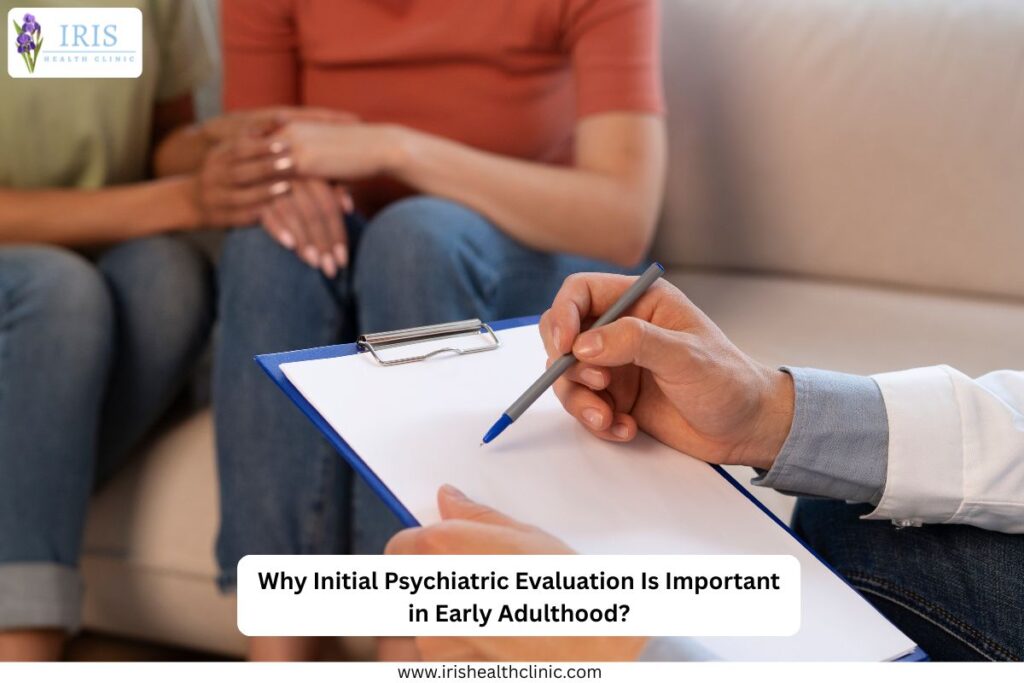Early adulthood is a transition period full of alterations, turmoil, and opportunities. Young adults are prone to intense emotional and psychological pressure as they cope with school life, work, love, and self-sufficiency. The early identification and intervention are vital resources to remove and eliminate mental health issues permanently. The Initial Psychiatric Evaluation is one of the potent tools in this process.
This kind of assessment gives a clear picture of the mental state of an individual in a systematic manner. It can assist clinicians to see the whole picture of the emotional, behavioral, medical, and psychological status of a person. The initial assessment of psychiatric work encompasses ruling out possible disorders and providing proper treatment prior to the exacerbation of conditions.
What Is an Initial Psychiatric Evaluation?
A first psychiatric assessment is a thorough health appraisal by a licensed mental health expert. It collects comprehensive data on the mental, emotional, and physical well-being of the patient. Clinicians investigate the case history, analyze family history, and look at behavioral patterns. The objective is to identify or exclude mental health conditions and develop a basis for an individual therapy plan.
There are a number of components of this assessment:
- Clinical interview in order to determine presenting concerns
- Mental status examination assessing cognition, behavior, and mood
- Reviews of psychosocial history/ work, relationships, and stressors
- Medical checkup of previous diseases and drugs
- Risk assessment for self-harm or harm to others
When Should You Consider an Evaluation?
Some forms of mental health disorders, like depression, anxiety, bipolar disorder, and substance abuse, tend to exhibit signs early enough. When left untreated, these issues can disrupt work, school, and relationships.
But once they are discovered through a systematic assessment, they are highly curable by therapy, medicine, or lifestyle modification. An outpatient psychiatric evaluation should be considered in case you or your loved one is affected by any of the following:
- Consistent alteration in mood or deep depression
- Inability to concentrate, decide, or cope with daily chores
- Nervousness, panic attacks, or phobias
- Withdrawal from family or social life
- Thoughts of self-harm or hopelessness
- Sudden sleep or appetite changes
- Difficulty managing stress or responsibilities
The Need for Personalized Mental Health Diagnosis
The core outcome of a psychiatric assessment is a mental health diagnosis. Mental health professionals use diagnostic tools to identify specific conditions and develop tailored interventions. Each patient is unique, and so is their path to recovery.
A personalized mental health diagnosis considers the person’s life story, challenges, strengths, and needs. It creates a framework for treatment, helping clinicians recommend therapies like cognitive behavioral therapy (CBT), mindfulness, family therapy, or medication.
Comprehensive, Integrated Treatment Plans
An effective psychiatric evaluation offers clarity and opens the door to effective treatment. Clients work closely with compassionate and licensed professionals to build a customized care plan. These plans often include:
- Brainspotting
- Dialectical Behavioral Therapy (DBT)
- EMDR
- Motivational Interviewing
- Medication-Assisted Treatment
- Peer Recovery Support Services
- Trauma-Informed Care

Understanding Outpatient Psychiatric Support
Outpatient psychiatric assessment is flexible for individuals seeking assistance without forfeiting their regular lives. It can give as high-quality care as inpatient efforts but offers individuals the possibility to continue employment, school, and uphold relationships.
Outpatient psychiatric evaluation provides you with access to frequent and ongoing sessions, close monitoring, and support for a long-lasting recovery. This format can include family members as well, building the support system and making treatment more efficient.
Benefits of Periodic Psychiatric Assessments
Mental health is dynamic. Check-ups help in monitoring progress, modification of treatment regimens, and the emergence of new issues. Follow-ups are made to make therapies relevant and effective. They also enable the patients to remain proactive in their mental journey.
In case you have been in inpatient treatment in the past, outpatient psychiatric assessment offers a continuation of care. It assists in decreasing the chances of a relapse by strengthening healthy behaviors and coping mechanisms. Outpatient mental health programs provide caring assistance in an open, non-judgmental environment. It enables the individual to heal without worrying about being shamed over something that they actually need help with.
Common Diagnoses Identified During Evaluation
Seeking an outpatient psychiatric evaluation during early adulthood may help avoid the progression of any symptoms or a lifelong disability. It could be useful in the diagnosis of disorders including:
- Major depression
- Generalized anxiety disorder
- Bipolar disorder
- PTSD
- Schizoaffective disorder
- Eating disorders
- Obsessive-compulsive disorder (OCD)
- Attention-deficit/hyperactivity disorder (ADHD)
- Dissociative disorders
The Role of Family and Support Systems
A lot of people request an initial psychiatric assessment following a distressing life event such as divorce, job loss, or grief. These tests also evaluate sleep problems, mood swings, or emotional desensitization, which are unpleasant in everyday life. Young people in early adulthood may have identity crises and existential crises, areas that can be addressed through a psychiatric evaluation and resolved with professional insight and supportive care.
During an initial psychiatric evaluation, clinicians may involve family members to better understand behavior patterns, historical events, or genetic tendencies. This collaborative approach helps ensure a well-rounded understanding of the patient’s life and symptoms.
Conclusion
Mental health care is a journey that begins with understanding yourself better. A thorough psychiatric initial assessment helps you or your loved one gain insight into thoughts, feelings, and behaviors. More importantly, it opens the door to healing, growth, and long-term wellness.
Whether you are feeling overwhelmed, uncertain, or simply curious about your mental health, seeking an initial psychiatric evaluation is a strong first step. Schedule your comprehensive psychiatric assessment with Iris Health Clinic today.

